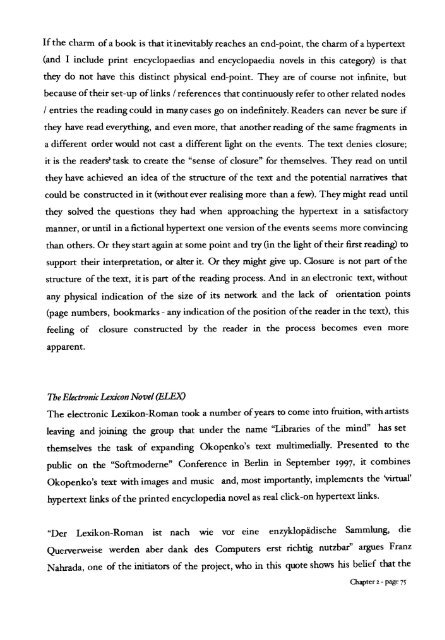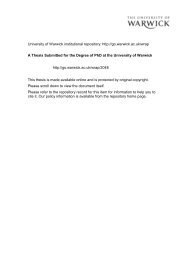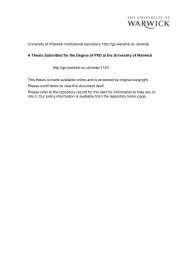From Page to Screen - WRAP: Warwick Research Archive Portal ...
From Page to Screen - WRAP: Warwick Research Archive Portal ...
From Page to Screen - WRAP: Warwick Research Archive Portal ...
You also want an ePaper? Increase the reach of your titles
YUMPU automatically turns print PDFs into web optimized ePapers that Google loves.
Ifthe charm of a book is that itinevitably reaches an end-point, the charm ofa hypertext<br />
(and I include print encyclopaedias and encyclopaedia novels in this category) is that<br />
they do not have this distinct physical end-point. They are of course not infinite, but<br />
because oftheir set-up oflinks / references that continuously refer <strong>to</strong> other related nodes<br />
/ entries the reading could in manycases go on indefinitely. Readers can never be sure if<br />
they have read everything, and even more, that another reading of the same fragments in<br />
a different orderwould not cast a different light on the events. The text denies closure;<br />
it is the readers' task <strong>to</strong> create the "sense of closure'" for themselves. They read on until<br />
they have achieved an idea of the structure of the text and the potential narratives that<br />
could be constructed in it (without ever realising more than a few). They might read until<br />
they solved the questions they had when approaching the hypertext in a satisfac<strong>to</strong>ry<br />
manner, oruntil in a fictional hypertext one version ofthe events seems more convincing<br />
than others. Or theystart again at some point and tty (in the light oftheir first reading) <strong>to</strong><br />
support their interpretation, or alter it. Or they might give up. Closure is not part ofthe<br />
structure of the text, it is part ofthe reading process. And in an electronic text, without<br />
any physical indication of the size of its network and the lack of orientation points<br />
(page numbers, bookmarks - any indication ofthe position ofthe reader in the text), this<br />
feeling of closure constructed by the reader in the process becomes even more<br />
apparent.<br />
The Electronic Lexicon Novel (ELEX)<br />
The electronic Lexikon-Roman <strong>to</strong>ok a number ofyears <strong>to</strong> come in<strong>to</strong> fruition, withartists<br />
leaving and joining the group that under the name "Libraries of the mind" has set<br />
themselves the task of expanding Okopenko's text multimedially. Presented <strong>to</strong> the<br />
public on the "Softmodeme" Conference in Berlin in September 1997, it combines<br />
Okopenko's text with images and music and, most importantly, implements the 'virtual'<br />
hypertext links ofthe printed encyclopedia novel as real click-on hypertext links.<br />
"Der Lexikon-Roman ist nach wte vor eine enzyklopadische Sammlung, die<br />
Querverweise werden aber dank des Computers erst richtig nutzbar" argues Franz<br />
Nahrada, one of the initia<strong>to</strong>rs of the project, who in this quote shows his belief that the<br />
Chapter 2 - page75





